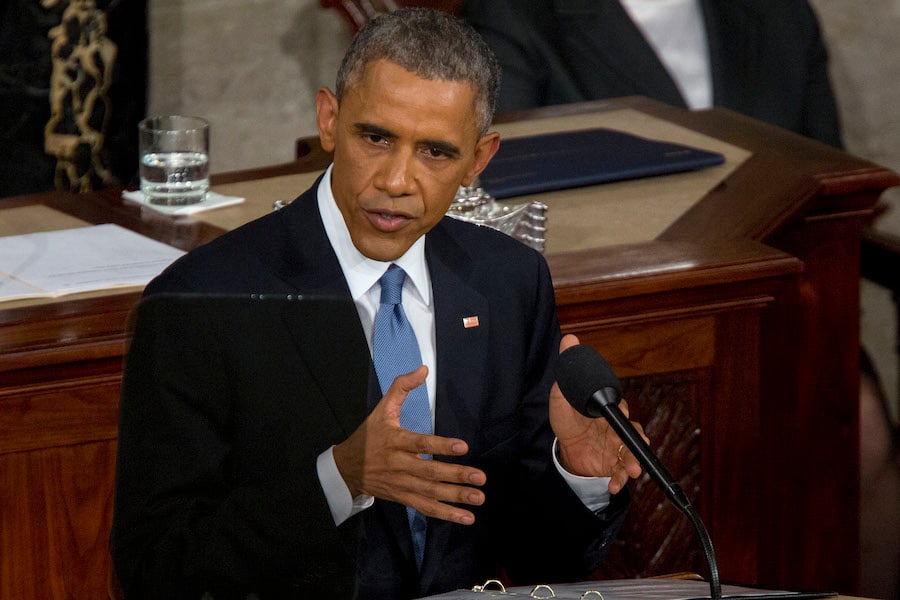In budget proposal, president to offer companies system they have sought but on less favorable terms.
President Barack Obama will propose that U.S.-based companies pay a minimum 19% tax on their future foreign earnings, capturing profits that are now often beyond the government's reach.
Mr. Obama will also seek a 14% mandatory tax on about $2 trillion in stockpiled offshore profits, said two people familiar with his budget proposals, declining to be named because the document won't be made public until Feb. 2. Companies would pay that tax regardless of whether they bring the money back to the U.S., the two said, creating a revenue stream the president would use to pay for roads, bridges and other infrastructure projects.
Mr. Obama's latest proposals add new details to the administration's efforts to revamp the U.S. business tax system. The issue has been stalled in Congress, though lawmakers of both parties say they see potential room for agreement on business taxes.
In one sense, Mr. Obama is offering U.S. companies the kind of system they have sought — one with lower corporate marginal tax rates and with future foreign profits subject to little or no extra U.S. tax when brought home.
However, he's offering to do so on terms that are less favorable than companies would want, with rates that could mean significant tax increases for companies that have been shifting profits to jurisdictions such as Bermuda and Ireland and paying less than 10% on their foreign profits.
“The basic outline of a deal on the most important component of corporate tax reform is falling into place,” said Ed Kleinbard, a tax law professor at the University of Southern California who has criticized the current system that often lets companies avoid paying taxes anywhere.
$238 BILLION
A proposal last year from Dave Camp, then the Republican chairman of the House Ways and Means Committee, would have taxed the one-time profits at 8.75% for cash and 3.5% for other assets. Mr. Camp didn't use a pure minimum-tax system for future profits, and still, his plan didn't get universal acclaim from U.S. multinational corporations.
Even though Mr. Obama's proposed rates are higher, “that's what negotiations are for,” Mr. Kleinbard said.
The president will unveil the proposals as part of a $3.99 trillion budget designed to help lower- and middle-class Americans. The plan would yield $565 billion over 10 years, according to one of the people. The one-time tax on stockpiled profits would produce $238 billion, according to an administration document.
35%
Under current law, U.S. companies owe the full 35% U.S. tax on income they earn around the world. They get tax credits for payments to foreign governments and don't have to pay the U.S. tax until they bring the money home.
That system gives companies an incentive to push profits outside the U.S. and leave them there. Apple Inc. and Google Inc. are among the many U.S. companies doing that, and companies' disclosures indicate how little foreign tax they pay.
Microsoft Corp., for example, holds $92.9 billion in profits outside the U.S. If that money were brought home, the company would owe $29.6 billion in U.S. taxes — or a 31.9% rate.
Because tax rules call for paying the difference between the foreign tax rate and the 35% corporate levy, that means the company could have paid as little as 3.1% in foreign taxes on that income.
Mr. Obama wants to lower the corporate tax rate to 28%, and 25% for manufacturers. Republicans want a 25% rate for all corporations.
A 19% minimum tax on foreign earnings — without an extra layer of tax upon repatriation — could give companies an incentive to move profits overseas.
It would also mean that U.S. companies operating in most major industrialized countries would owe little or no U.S. tax on those profits. The exception would be places such as Ireland, with its 12.5% corporate tax rate.
Mr. Obama's proposal, however, will include rules that would make it harder for U.S. companies to shift profits overseas or to change their addresses through inversion transactions, according to the administration document.
MORE FLEXIBILITY
The president's taxing and spending plans, which will meet stiff resistance from the Republican-led Congress, would result in a deficit of $474 billion for the fiscal year that begins Oct. 1, according to the administration's projection.
While that number is a little above estimates for the current fiscal year — 2015 — it gives Mr. Obama much more flexibility than the $1.4 trillion deficit that racked up in the wake of the 2008 financial crisis. The deficit as a percentage of gross domestic product would be 2.5%, down from 3.2% in fiscal 2015. Over the next decade, the budget estimates it wouldn't rise above 2.6% in any year.







